大同 Datong
So I am spending three days in Datong, in Shanxi province, six hours by train from Beijing. Many have asked why I wanted to see Datong, both Westerners and Chinese. I even spoke with a representative of the local Turist bureau said that they recommend two days for seeing Datong, and that three days seemed exaggerated (well, that was not the word he used, but what he meant). He was otherwise very helpful
Datong is not just yet another provincial backwater, it was once the capital of China, or at least the Northern half thereof. After the Wei dynasty had unified northern China in 439 they put their capital in Pingcheng, as Datong then was called. This was the high point of Datong, when for example the Yungang caves were constructed (I have visited them and will report).
The city continued to flourish also after the capital was moved in 494 to Luoyang. It contained many Buddhist monasteries, temples, and such, some of which survives. What also survives are remnants of the city wall. So why wonder why I wanted to go to Datong. I am grateful to Xiaojie, who suggested this trip when it turned out to be impossible to get a train ticket for anywhere south of the Huang He (probably too hot there anyway for my northern physiognomy; Datong is at 1216 meters above sea level - that is 3990 ft for those of you who have not yet accepted the Enlightenment - and is pleasantly cooler than Beijing.
Datong is in the middle of a coal field, and there is a huge coal mine not far from the Yungang caves. As places that have access to cheap coal usually are, Datong was a center for steam locomotives. In fact, such engines were manufactured here until 1989, most likely the last factory in the world to produce steam locomotives. According to the guide book I have to the Transsibirian Railroad (the Beijing branch of which goes through Datong), the factory still makes parts for steam engines, but they also say that it is possible to get to go on a guided tour of the factory, if one contacts the Tourist Bureau. That was why I asked the reception to call them. Alas, it is no longer possible, and the train engine museum is closed, or so I was told.
So I will have to do with the medieval stuff!
It is very fun to be here in many ways, but I have particularly noticed that the inhabitants are not used to western tourists. There is an Italian family staying here in the hotel (Datong Yungang International Hotel; recommended!), but they seem very keen to avoid eye contact with me. Otherwise, I have seen very few westerners, and clearly the inhabitants have not seen more. When I am walking on the sidewalks, people look at me. The young ones often giggle, and some (especially the ones in school age) say "hello," to which I always respond "hello, ni hao".
When I walked from the train station to the hotel (a little longer than I had imagined; I have not yet learnt that Chinese blocks are longer than in Ludvika), I was stopped by this charming trio.
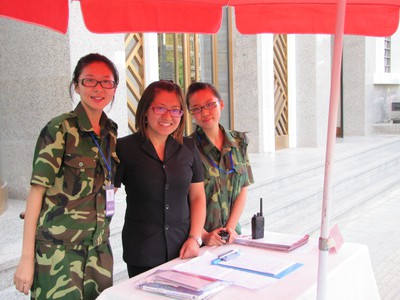
They were in training to staff a hotel that soon will be opened. I think the one in black is a manager, and I suppose it was good training for them to talk with me. We chatted for a while, both in English and Chinese, and they allowed me to photograph them. Otherwise, I have had very little experience of what my new Baedeker from 2000 say: that the Chinese do not like to be photographed. Some have even asked me to photograph them, like these two strapping young men, Messrs. Ma Hui Chao and Jing Wen Hui, with whom I spoke quite a lot. They are students in "Zhong xue", which they translated "Middle school", although I wonder if that would not be what in the USA is called high school (gymnasieskola i Sverige).
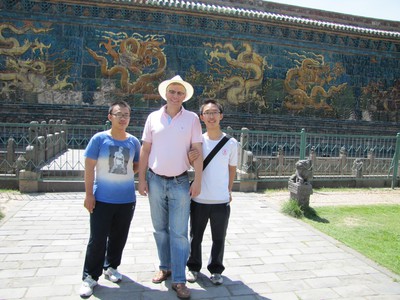
You can also see that at least Hui Chao was not afraid of something else that Baedeker says the Chinese abhor: bodily contact. He grabbed me as you can see. Soon there were more people who wanted to be in a picture. They insisted to give me their telephone numbers, and they got mine.
All in all, people here are amazingly friendly and willing to work to understand and to make themselves understood. I think it helps that I bothered to learn some phrases in Chinese. People, by the way, praise my pronounciation, which surely is largely politeness, but also a reflection of that I had a very good teacher in Joyce.
I occasionally feel the smell of burning coal, but not particularly often. There is at least one giant thermal power plant just outside town, with at least five enormous chimneys that spew out dense smoke. Those must be fired by coal. The town is also very dusty. My shoes are light brown when I come in, but I have noticed no accumulation of coal soot on collars and such, as one is supposed to get in coal towns. The air is supposed to be very polluted, but as in Beijing, I have had no immediate problems with that. Although I suppose that yellow tinge to these clouds might not be entirely healthy.

Well, this as an introduction to Datong. I will deal with specific issues in separate entries. Here follows some assorted photos from the city.
Feuerwehr? Well, the Datong fire brigade sports a German sobriquet.
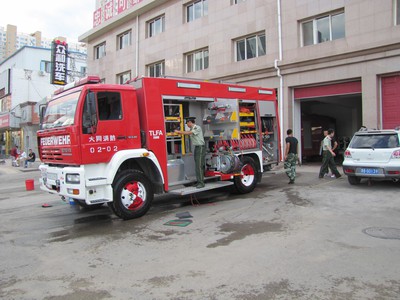
There are many street vendors in Datong, often selling off the back of a pickup truck.
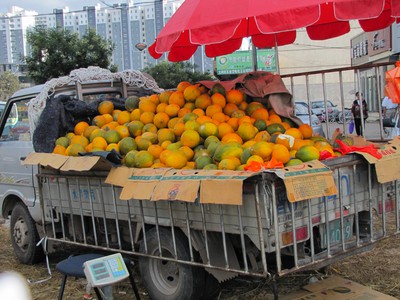
Garbage collection in Datong. I am sorry for these poor people.
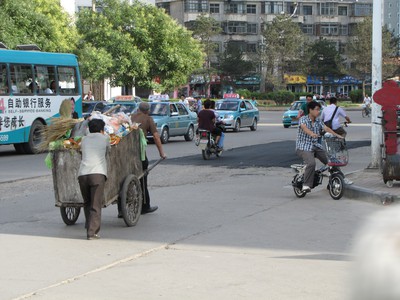
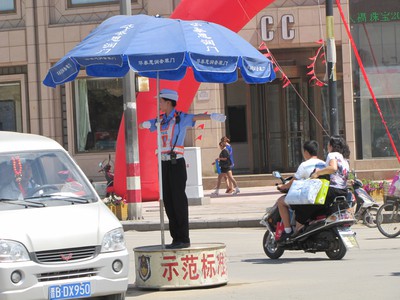
No, I have not tried this restaurant. And I will not.
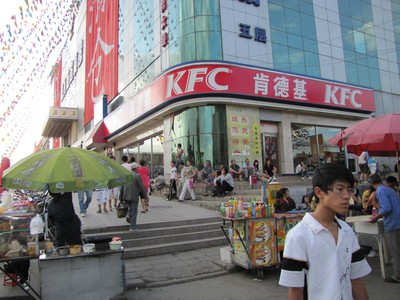
Datong is not just yet another provincial backwater, it was once the capital of China, or at least the Northern half thereof. After the Wei dynasty had unified northern China in 439 they put their capital in Pingcheng, as Datong then was called. This was the high point of Datong, when for example the Yungang caves were constructed (I have visited them and will report).
The city continued to flourish also after the capital was moved in 494 to Luoyang. It contained many Buddhist monasteries, temples, and such, some of which survives. What also survives are remnants of the city wall. So why wonder why I wanted to go to Datong. I am grateful to Xiaojie, who suggested this trip when it turned out to be impossible to get a train ticket for anywhere south of the Huang He (probably too hot there anyway for my northern physiognomy; Datong is at 1216 meters above sea level - that is 3990 ft for those of you who have not yet accepted the Enlightenment - and is pleasantly cooler than Beijing.
Datong is in the middle of a coal field, and there is a huge coal mine not far from the Yungang caves. As places that have access to cheap coal usually are, Datong was a center for steam locomotives. In fact, such engines were manufactured here until 1989, most likely the last factory in the world to produce steam locomotives. According to the guide book I have to the Transsibirian Railroad (the Beijing branch of which goes through Datong), the factory still makes parts for steam engines, but they also say that it is possible to get to go on a guided tour of the factory, if one contacts the Tourist Bureau. That was why I asked the reception to call them. Alas, it is no longer possible, and the train engine museum is closed, or so I was told.
So I will have to do with the medieval stuff!
It is very fun to be here in many ways, but I have particularly noticed that the inhabitants are not used to western tourists. There is an Italian family staying here in the hotel (Datong Yungang International Hotel; recommended!), but they seem very keen to avoid eye contact with me. Otherwise, I have seen very few westerners, and clearly the inhabitants have not seen more. When I am walking on the sidewalks, people look at me. The young ones often giggle, and some (especially the ones in school age) say "hello," to which I always respond "hello, ni hao".
When I walked from the train station to the hotel (a little longer than I had imagined; I have not yet learnt that Chinese blocks are longer than in Ludvika), I was stopped by this charming trio.

They were in training to staff a hotel that soon will be opened. I think the one in black is a manager, and I suppose it was good training for them to talk with me. We chatted for a while, both in English and Chinese, and they allowed me to photograph them. Otherwise, I have had very little experience of what my new Baedeker from 2000 say: that the Chinese do not like to be photographed. Some have even asked me to photograph them, like these two strapping young men, Messrs. Ma Hui Chao and Jing Wen Hui, with whom I spoke quite a lot. They are students in "Zhong xue", which they translated "Middle school", although I wonder if that would not be what in the USA is called high school (gymnasieskola i Sverige).

You can also see that at least Hui Chao was not afraid of something else that Baedeker says the Chinese abhor: bodily contact. He grabbed me as you can see. Soon there were more people who wanted to be in a picture. They insisted to give me their telephone numbers, and they got mine.
All in all, people here are amazingly friendly and willing to work to understand and to make themselves understood. I think it helps that I bothered to learn some phrases in Chinese. People, by the way, praise my pronounciation, which surely is largely politeness, but also a reflection of that I had a very good teacher in Joyce.
I occasionally feel the smell of burning coal, but not particularly often. There is at least one giant thermal power plant just outside town, with at least five enormous chimneys that spew out dense smoke. Those must be fired by coal. The town is also very dusty. My shoes are light brown when I come in, but I have noticed no accumulation of coal soot on collars and such, as one is supposed to get in coal towns. The air is supposed to be very polluted, but as in Beijing, I have had no immediate problems with that. Although I suppose that yellow tinge to these clouds might not be entirely healthy.

Well, this as an introduction to Datong. I will deal with specific issues in separate entries. Here follows some assorted photos from the city.
Feuerwehr? Well, the Datong fire brigade sports a German sobriquet.

There are many street vendors in Datong, often selling off the back of a pickup truck.

Garbage collection in Datong. I am sorry for these poor people.


No, I have not tried this restaurant. And I will not.

Kommentarer
Postat av: Anonym
Fina bilder, kul att läsa om allt du gör!
Trackback
